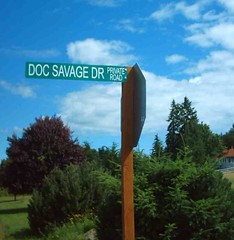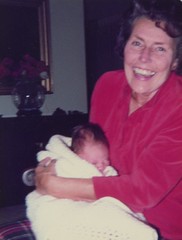It's my 51st birthday today, and I will do what I've done the past 10 years--give flowers to my mother on my birthday.
My birthday. It seems only right, doesn't it? I mean, what did I do to deserve a celebration (cake, candles, presents), other than to survive another year? On the day of my birth, she was in the hospital. She went through the pain. It was her accomplishment, not mine. And so the flowers, roses when she was alive, have become a tradition and I've maintained it. As a way of saying "thank you." I'm here because of her. And her choice to bear me. I feel the need to acknowledge that on this day. So, it's the long trek to the cemetery. I don't go there very often. Her birth. Dad's birth. My birth. That's it. One should spend as little time as possible in cemeteries.
Consciously, anyway.
The following is a piece I wrote (it's long, but it needs the set-up) for a friend,
Jeff Hoyt, who was auditing a class on story-telling at Antioch. The assignment was to write a story where wisdom was achieved--a "Wisdom Song." Jeff sent out a mass-e-mail asking for stories from his "Radio Community," and I wrote this in one sitting, very fast, because the story was--ala Brando's line in "Apocalypse Now"-- "like a diamond bullet." I remember the details of this so vividly, it's like it happened yesterday. I remember the inflection, and I remember the thoughts that raced through my head as it happened, and I'm frankly amazed I was able to keep my composure. I've told the story so many times to explain Alzheimer's and to get a laugh that my long-suffering wife has graduated from "brief eye-rolling" to "passive check-out 'til it's over." It still is such a clear delineation from knowing one thing to knowing another for me. There are others.
Anyway, I wrote it down and sent it to Jeff, who laughed. And it got some good reactions. The "lesson" was included in a piece Jeff produced and I remember he got a remark from the instructor like "Thanks, that was nice."
Wasn't
this guy, was it?
Hmmm.
Anyway, with only one change for presentation, this is what I wrote that night.
Thanks, Mary
My Mom died of Alzheimer’s in 2001.
Thanks. I’m sorry, too.
Before she died, my Sister and I went through some Herculean measures to make her quality of life as comfortable as it could be. The most prominent of these was to keep her in her home for as long as humanly possible. By the time she was diagnosed, what she was and was not able to do for herself had become obvious to the point where we couldn’t ignore it or rationalize it anymore. She couldn’t pay her bills. She couldn’t drive her car. She couldn’t cook her meals. She could walk to the mail-box and get her mail. She could maintain the demeanor of a hostess and make you feel comfortable – a trait she would keep to the day she died.
And she could still recognize us as her children.
She had also learned to give the appearance that she knew the identity of whoever stopped her on the street to strike up a conversation, and hold up her end of the conversation as if she knew whatever the other person was talking about…even if she didn’t have a clue. She never admitted to having Alzheimer’s. She denied it. And if she couldn’t recall a face or a place or a date, then she’d make it up. And she became increasingly comfortable in this world that she made for herself.
It would drive my Sister and me batty. An Alzheimer’s patient, because they’re losing their memory and the details of their life, will look for clues as to what that life could have been like. And they’ll make it up as they go along. They will also try to hide the disease from the people around them. This leads to paranoia. Suddenly, someone will tell you that something that you know to be true is not, and you begin to wonder why that person has it in for you. If you suddenly have misplaced something, it has probably been stolen. A request to go to the doctor leads to suspicions that you’re being forced against your will. A request to take some medication becomes a plot to poison you. It has nothing to do with reality, but reality has nothing to do with Alzheimer’s.
I once got a frantic call from my Sister. “Please!” she said. “You’ve got to tell me. Did Mom and Dad once own my apartment, and that’s why I’m living in it?” “Of course not!” I said. “They lived in the same house in Bellevue for 45 years.” “Thanks,” she said. “I know it’s true, but sometimes….she can be so damned convincing…”
My wife and I were planning a trip to Hawaii, and we’d be leaving in a couple of days. I went to Mom’s to pick up some bills to pay—I had been doing her books by this time—and check up on her, have a meal, scope out the house, anticipate problems. We had a fine time, and we were standing in my old bedroom, making small talk. “Now, where are you going on vacation?” she asked. “Hawaii, Mom.” She brightened. “Oh, your Dad and I loved Hawaii!”
Now, let me interject. My Dad had been at Pearl Harbor when the Japanese attacked. He was stationed aboard the Maryland. But, at the time the zero’s came in he was standing on the dock waiting to board the U.S.S. Arizona for Sunday church services. This is the Arizona that is still there, but it's now called the Pearl Harbor Memorial. The only reason he wasn’t on the Arizona when the attack came, was that he was waiting for a buddy who, for whatever reason lost to History, was late getting there. It was the only reason he wasn’t entombed with the other sailors on the Arizona, and it’s the only story he ever told about the War(Before the Alzheimer’s, Mom had told me that after V-J Day, the first year back, my Father would wake up every night, screaming. He spent the entire War in the Service, but the only story he ever told was about that near-miss through no fault of his own, but owing to the lateness of his friend. As a result, I never try to be on-time for anything.)
So, my Dad never wanted to go back to Hawaii. Never. Hated the idea. Whether it would trigger traumatic memories, or he just didn’t want to give ‘em another shot at him, he didn’t want to go. Not for vacation, not for Pear Harbor Survivor’s Meetings, not for anything did he want to go back to Hawaii. My Mother would suffer in silence all through the Sixties, when friends and relatives would take their tony vacations to the New State, and regale them with stories of hula girls and luau’s and the beaches of Waikiki and “you two REALLY should go.” But she knew it wouldn’t happen. It was a given. Dad did not want to go back to Hawaii. Been there. Done that. Survived it, barely. She understood that, and accepted it. If they were going on vacation it would be on the main-land. She knew that. We knew that.
“Oh, your Dad and I loved Hawaii,” my Mother said dreamily.
I scoffed. “Mom. You and Dad never went to Hawaii. Dad was at Pearl Harbor.” “I know that! But we certainly did go and we just had the best time!” “Mom! You didn’t! Dad hated Hawaii!” “Well, we most certainly DID! I remember the boats!” (She had every book ever written about Pearl Harbor and the attack. I think that, like the Japanese pilots that morning, she could identify every ship just by its silhouette!) “Mom, no-o! No-o! Dad had absolutely NO DESIRE to go to Hawaii after the War…” Well, you can guess how it went. Mom was vehement. She and Dad had TOO gone to Hawaii. She was sure of it. And I was just as sure that they hadn’t, and I had the advantage because I didn’t have Alzheimer’s. But sometimes, that’s not really an advantage. I should have stopped. I should have conceded. I should have let go of reality. But I couldn’t. As a result, she flew into a rage and she kicked me out of the house (something that had happened frequently since she’d been
diagnosed)…and don’t you ever come back…and I’ll do my own bills from now on…you’re probably stealing all my money. SLAM!
I was wrong. I knew I was right, but I was still wrong. I had unnecessarily agitated my Mother and thrown her into a tizzy -- a tizzy that would set her back. It was not her fault. She was sick. If there was fault, it was mine. I clung to my reality, and it really wasn’t that important. It was selfish. And I regretted it. I was still mad, but I regretted it. And the worst part was…I’d have to go back there eventually, anyway. I had to check on her. When Mom was first diagnosed, my Sister and I attended a lot of classes on the disease and care-giving and one axiom they drill into you is: “You cannot make them happy, but you must keep them safe.” Well, I failed at both. I had to go back.
I had one thing going for me, I realized. She had Alzheimer’s. She was probably going to forget the whole thing anyway. With my Mother, that was never certain. She was a Nixon Republican and she could hold a grudge. But I had to go back, so I was determined to act like nothing had happened and make the best of it. The next day, I knocked on the door. She opened it a crack. She looked at me warily. “Oh. Hello.” She knew she was mad at me, but she couldn’t remember why. She looked stern, but she didn’t have a full-mad look, what my Father described as “having a face like a meat-axe.” “Hi, Mom!” I said cheerily and acted like nothing had happened the previous day, and within a couple of minutes, we were laughing and joking and having a fine visit. I made her a meal, and we talked, and I went over bills with her that she couldn’t comprehend. I asked her if she still wanted me doing them for her, and “Yes, of course! That would be fine, dear!”
So we had a nice visit. As I was leaving, she smiled and said, “Now…WHERE are you going on your vacation again?”
I lowered my head and smiled. “Hawaii…….”
She brightened. “Oh, your Dad and I lo-oved Hawaii.”
“Yeah! Yeah, I’ll bet you did.” I said. “I’m looking forward to it.”
“Oh, that’ll be so nice. You have fun.” That out of the way, her face turned serious.
“Now…are you going to drive?”
“Uh….no. No. I thought we’d fly this time…”
“Oh, good!” She patted my arm. “That’ll be so much easier!”
“I’ll say!”
That’s when I turned the corner on Alzheimer’s and my Mother. I couldn’t cure it. I couldn’t make it better. I couldn’t cram reality back into her life. I couldn’t do anything about that. But I could keep her safe. And I could make what she had left as pleasant and as free of stress as I could. And if I let reality slip a little bit, it didn’t matter much in the end. But it meant a lot to her. I could voluntarily let things go, since she had so much taken away from her. And, with time, she wasn’t my Mother anymore. The disease eventually broke that relationship down. I wasn’t her son. That designation confused and worried her, I began to notice. So before it made her afraid, I dropped it completely, and I was simply that nice man who came to visit and joked and laughed and seemed to know her. And she was simply “Mary” – this woman who had lived an amazing, long life that I knew very well and who deserved the best I could give her…even if she was no longer my Mother.
I learned it was alright to let go...of her, and reality. Eventually, you have to. It's inevitable.
















